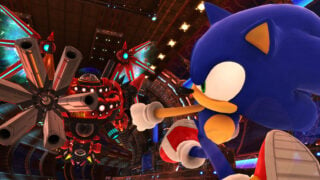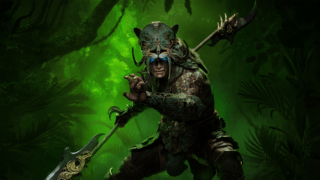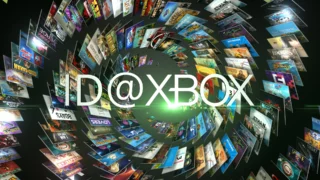Interview: Sonic Team on how looking back helped Sonic move forwards
Takashi Iizuka and Shun Nakamura discuss the return of Sonic Generations

Sonic the Hedgehog’s career is in rude health at the moment.
Long time fans will remember all too well the string of strange, disappointing Sonic games that plagued the series in the back half of the 2000s, a run that makes Sonic Team’s recent successes all the more worthy of praise.
For many, one of the first big turning points was 2011’s Sonic Generations, which celebrated Sonic’s past while bringing togther the 2D and 3D branches of the series.
Since then, the blue blur has never looked back – other than in a nostalgic sense – and now has a string of other critically acclaimed games underhis belt, along with two movies and a third on the way.
It’s fitting, then, that amidst all this popularity comes the return of Sonic Generations in a new remastered version, Sonic X Shadow Generations. As well as improved visuals for the original game, this new release also includes brand new stages starring Shadow the Hedgehog (who probably symbolises the series’ uptick in popularity more than anyone or anything else).
To discuss the game’s return, VGC sat down with Sonic Team head Takashi Iizuka and game designer and producer Shun Nakamura.
The original release of Sonic Generations almost feels like one of the turning points for Sonic, at least in terms of review scores, after a sort of less well-received period with games like Sonic 2006, Sonic and the Secret Rings, Sonic and the Black Knight, and Sonic Unleashed. Do you think those games were a necessary period in Sonic’s history because they may have refocused Sonic Team and let it breathe new life into the series?
Takashi Iizuka: Yes, Sonic Generations was our 20th anniversary title and it was there to really take all of the 2D side-scrolling Sonic platform action games, as well as all of 3D high-speed platform action games, and get this wide spectrum of great content.
[It meant] that if you were brand new to a Sonic game you were getting all these amazing moments, all these things that people remember and you were now up to speed with a lot of fans, and if you were already a fan, you were going in there like “Oh, I know everything, this is amazing, I remember that too.”
And it was one of those titles that had so much of these moments in there that it really was like a defining moment for what a Sonic game could or would be.
And so when we talk about Generations being that turning point, it probably was, because it started really defining the content that people liked and the content people wanted to see more of.
Do you think that focus on nostalgia played a big part in that? Because games like Secret Rings, Black Knight and the like felt like they were constantly looking for new ideas, whereas with Generations it felt like looking back was what finally helped Sonic to push forward.
TI: Yeah, exactly, because Generations was that pure Sonic experience. A lot of the games from the past were always trying to add something new and different to make them very unique, so the controls were often different, the ideas or the things you could do were very different.
And Generations was the first time when we were saying “hey, because we’re looking back, we’re focusing more on that high speed platform action.” And it became that pure expression of a high speed platform action game, which is what everyone started gravitating towards.
And now obviously the big addition this time around is the second game, Shadow Generations. Shadow’s popularity has grown a lot over the years, so was giving him such a central role this time a way of almost making up for the fact that he wasn’t in it much the first time around?
TI: Sonic Generations was for Sonic’s 20th anniversary, so the key idea behind what game we were going to make was that it’s got to all be about Sonic. So Shadow does show up as a rival in Sonic Generations, but the whole point was really to focus on Sonic, because it was his 20th anniversary.
But this time we have the Sonic the Hedgehog 3 movie coming out this holiday, and there’s going to be a focus on Shadow in the movie, so we know people are going to see Shadow and know him from the movie.
And so this is our opportunity, because we have Sonic Generations – which was a game that kind of introduced newcomers to Sonic the Hedgehog – and this is our chance to make something to also introduce people to Shadow.
So we have people who maybe only know Sonic from the movies but haven’t played the games, so maybe this is their first time seeing Shadow in the movie as well.

So with this one title, we can deliver them all this great past, amazing moments from Sonic’s history, so they can play the game and understand all these cool game moments about Sonic the Hedgehog.
And at the same time, the team have built Shadow Generations, which also does the same thing – it goes back and shows all these great moments from Shadow’s past and really explains the character, and presents all this cool Shadow content.
So if you know nothing, this is the one title you can get that will now bring you up to speed with everything Sonic and Shadow.
Shadow Generations shows moments from Shadow’s past, but based on a recent trailer it looks like it’s also got some content in there from Sonic Frontiers. You know how perceptive Sonic fans are – as soon as that trailer was released a lot of them pointed out that Shadow wasn’t in Frontiers. Was that really just a nod to Frontiers to celebrate its success, and should fans not read too much into it?
Shun Nakamura: Well, Sonic Generations is a game where you’re kind of going back to the past. The Time Eater is there, he’s destroyed the space-time continuum, everything’s in this void together.
The Shadow Generations portion of the game is still part of the Generations story, so the Time Eater has affected Shadow’s of everything as well. That allows us to put everything out there and have Shadow experience a lot of this stuff from the past.
We also have things like Doom Powers, that mean Shadow is going to get these new abilities and he’s going to be able to use these new abilities as he goes back and experiences a lot of the things from the past.
And one of the fun things from the past that the team wanted to portray, that we thought would be really interesting for fans is to… remember, if we’re talking about the past that’s going from when Shadow Generations is launched backwards, and that does include Sonic Frontiers.
And so one of the interesting ideas we had was, what if Shadow went through the space-time continuum, everything the Time Eater has messed up, and Shadow is now in the Sonic Frontiers environment? Wouldn’t that be interesting for fans, and wouldn’t that really make them excited?
So getting the fans excited over things like that is what we wanted to do, and we’re able to do it because of the Generations format.
“What if Shadow went through the space-time continuum, everything the Time Eater has messed up, and Shadow is now in the Sonic Frontiers environment? Wouldn’t that be interesting for fans, and wouldn’t that really make them excited?”
Speaking of Sonic’s past, it’s generally accepted that the three Sonic Advance games are among the best 2D Sonic games, but other than a Virtual Console release on Wii U in Japan they haven’t really seen much of a re-release. Is there a licensing reason or some other reason why those games have never re-released, either in a standalone retro collection or in one of Nintendo’s online game libraries?
TI: There’s currently no plans for the Sonic Advance series to be remade or remastered, but we don’t know what the future holds.
Katsuyuki Shigihara was a director on Sonic Origins, which took Sonic 1, 2, 3 and CD, and we remastered that and brought it out for fans to enjoy. And if we have the chance, if there’s an opportunity for the Advance series to also get that treatment, or whatever circumstances may pop up, we’d love to do it.
I asked Sonic fans if there was anything they wanted to ask you, and I’m sure you can guess the two things that came up time and time again. If Chao Garden or Sonic Adventure 3 ever do happen, has fan expectation been built up to the point where neither could truly live up to those expectations?
TI: When we talk about Chao Garden specifically, I know everyone’s like “I want Chao Garden, I want Chao Garden”. But Chao Garden is a piece… it’s part of the whole Sonic Adventure series game.
It’s not a standalone game, it’s integrated into the whole Adventure series gameplay, so we can’t just break it off and make it a thing.
And so it’s like, alright, well if you’re asking for Chao Garden and Adventure 3 then that’s pretty much asking for Adventure 3.
I think at some time I’d like to say “hey, yeah, we’re making Adventure 3”, but we don’t have plans for that yet. It’s just one of those things that if, if the stars align and it can all happen, then yeah, we’d love to make it.

Does it feel like much of the hype power of Sonic Adventure 3 is in its title? There have been so many critically acclaimed Sonic games out in recent years that it feels like at this point some of the fans who want to see Sonic Adventure 3 partly want to see it because they’ve been waiting so long just to see that title confirmed. Could you have, for example, just slapped the Sonic Adventure 3 name on something like Sonic Frontiers to put an end to it?
TI: As someone who made the Adventure series, there’s a lot of requirements for what an Adventure game needs to have in order for it to really be an Adventure game.
So when we talk about Frontiers, the whole concept for that was a need to have this new gameplay style, that’s the ‘open zone’ gameplay, we had Titans on the map that you had to do battle with, and that really defined what Sonic Frontiers was.
In a similar way, Sonic Colours had colour powers, Sonic Generations had the whole Time Eater and going through history, all these games had something new to them that made them what they were and gave them the titles that they were titled.
And so, in order to really make like the next Adventure game, I think there’s a whole checklist of things that would need to be in there – ways of presenting things, gameplay – they would need to be in there to really define it as something that should be called Sonic Adventure.















